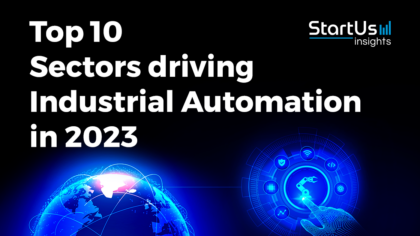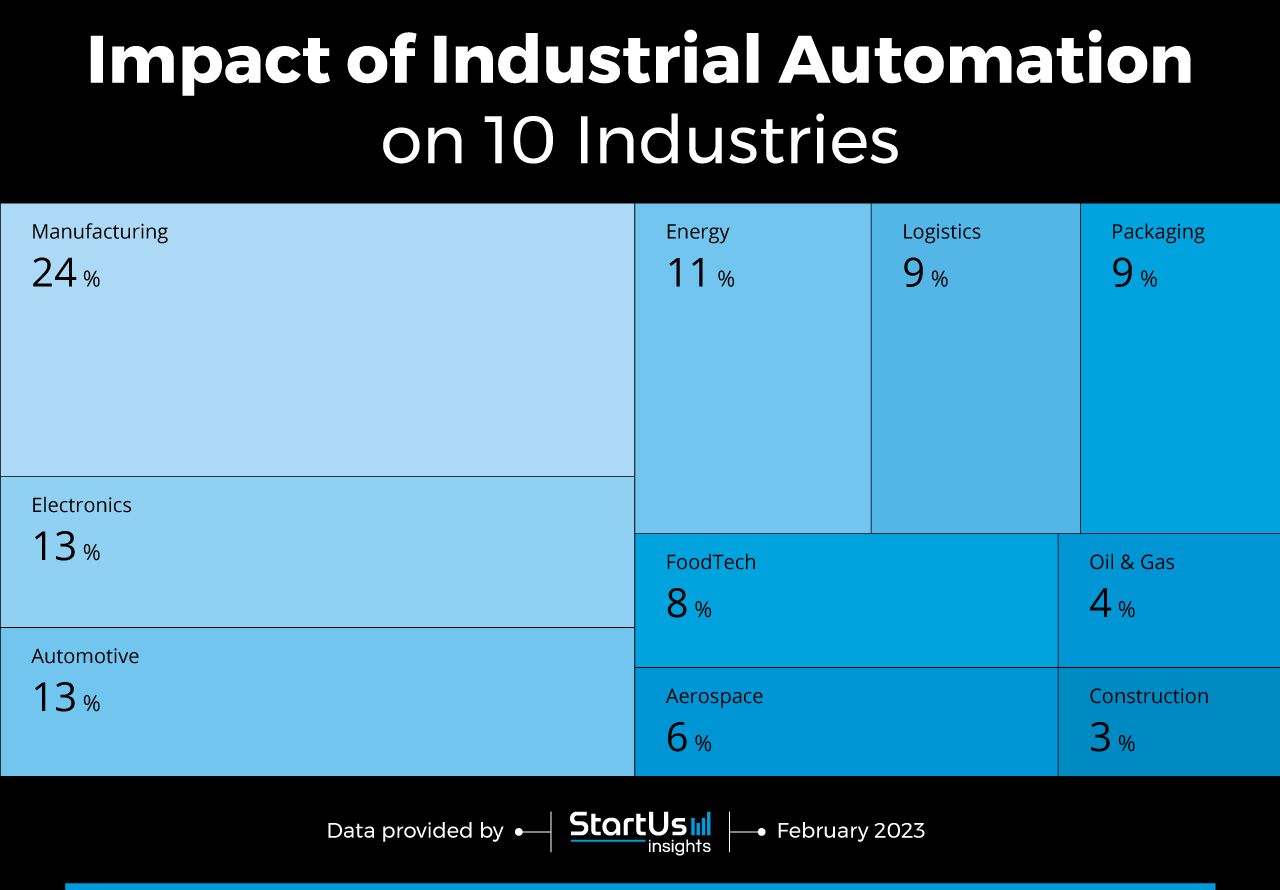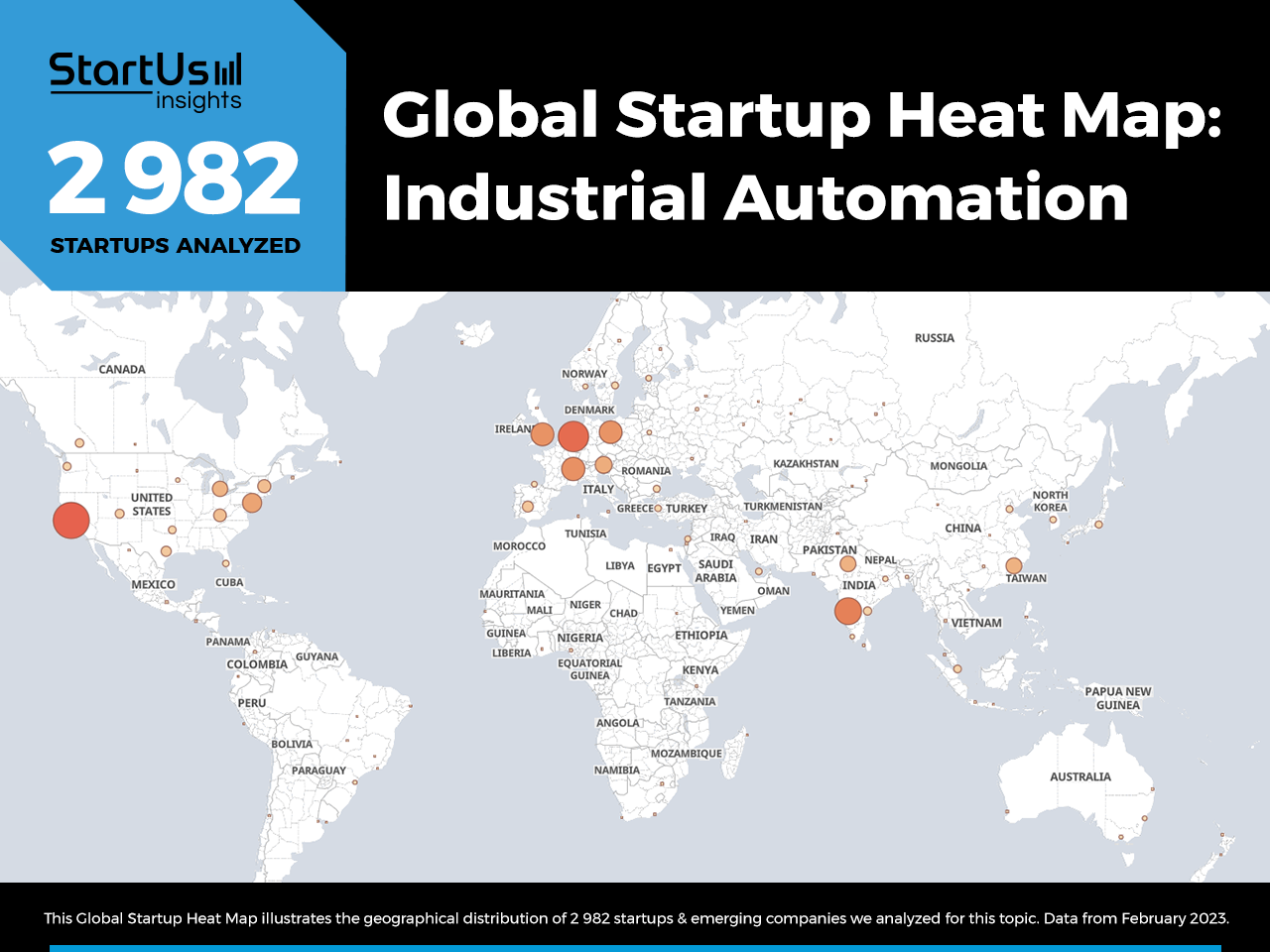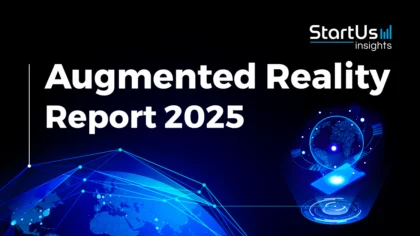Accelerate Productivity in 2025
Reignite Growth Despite the Global Slowdown
Labor shortage and low productivity hinder manufacturers’ efforts to scale operations and address growing market demands. That is why factories are leveraging industrial automation to tackle these issues. We give you data-driven insights into the top industrial automation applications based on our analysis of 2900+ companies & technologies.
For example, robotic production lines automate part assembly and product packaging to increase factory throughput. Read more to explore the impact of industrial automation on 10 industries and how they advance your business.
Tree Map reveals the Impact of Industrial Automation on 10 Industries
Based on the Innovation Map, the Tree Map below illustrates the application areas of industrial automation in 2023 and 2024. Manufacturing facilities see the most activity in the automation sector as they integrate AI and robotics into production lines to improve operational efficiency. At the same time, automotive, oil and gas (O&G), energy, and food industries leverage the Internet of Things (IoT)-driven automation to improve visibility into machines and operations.
The electronics sector uses advanced robotics and AI to handle complex fabrication processes. On the other hand, logistics automation improves fulfillment efficiency. Lastly, the aerospace sector leverages automation to reduce turnaround periods and time-to-market, whereas the construction industry uses it to decrease materials wastage and tackle labor shortages.
Global Startup Heat Map covers 2982 Industrial Automation Startups & Scaleups
The Global Startup Heat Map below highlights the global distribution of the 2982 exemplary startups & scaleups that we analyzed for this research. Created through the StartUs Insights Discovery Platform, the Heat Map reveals that the US and Western Europe have a high concentration of industrial automation startups, followed by India.
Below, you get to meet 10 out of these 2982 promising startups & scaleups as well as the solutions they develop. These 10 startups are hand-picked based on criteria such as founding year, location, funding raised, and more. Depending on your specific needs, your top picks might look entirely different.
Interested to explore all 2900+ industrial automation startups & scaleups?
Top Industrial Automation Examples across 10 Industries
1. Manufacturing
Industrial automation enables continuous mass production in manufacturing facilities. It reduces dependence on manual labor and, in turn, lowers assembly times and errors. That is why startups leverage AI, machine learning, and robotics to automate production lines.
For instance, some startups create 3D printing workflows that automate end-to-end production processes from part development, post-processing, and product packaging. This enables manufacturers to integrate additive manufacturing systems and mitigate in-house process development. Moreover, production line and process automation simplify adaptive control and product quality monitoring.
Additive Manufacturing Technologies (AMT) enables Automated Post-Processing
AMT is a UK-based startup that develops automated post-processing solutions for manufacturers. The startup’s industrial depowdering and shot blasting system, PSOTPRO DP PRO, has high throughput and supports high processing volume.
AMT’s other product, POSTPRO SF100, automates surface finishing for 3D-printed polymer parts with complex geometries and internal cavities without degrading mechanical properties. These products enable manufacturers to optimize additive manufacturing lines for high-volume production and streamline operations.
2. Electronics
The electronics industry utilizes industrial automation to handle complex circuit packaging and fabrication processes. This improves accuracy in chip development while ensuring product consistency and homogeneity. Besides, electronics companies leverage AI and machine learning to automate circuit design, accelerating the time-to-market and design finalization.
Since operators quickly customize fabrication parameters in robotics-powered production lines, manufacturers are able to deliver personalized products based on client and market needs under low turnaround periods.
CELUS provides Automated Electronics Design
CELUS is a German startup that automates electronics design. The startup’s platform, CELUS Engineering Platform, uses AI to develop printed circuit board (PCB) designs based on user requirements and improve engineering data management.
As a result, electronics engineers are able to mitigate manual schematics development and accelerate circuit design. It also generates bills of materials (BOM), schematics, and PMCB floorplans, saving costs and accelerating the time-to-market.
3. Automotive
Labor shortage and assembly errors significantly affect automotive plant throughput. Factory automation uses AI, computer vision, advanced analytics, IoT, and robotics to tackle these issues. Startups aid industrial automation by developing solutions tailored for automotive processes and products.
For instance, some startups create AI-powered autonomous quality control systems that integrate with existing production lines. Such solutions enable vehicle manufacturers to improve production transparency, quality management, and industrial safety. They also allow businesses to leverage predictive maintenance to improve maintenance planning and reduce unexpected downtimes.
Auline advances Automotive Process Automation
Auline is a Polish startup that develops industrial automation solutions for automotive manufacturers. The startup creates bespoke automated systems based on client requirements.
This enables businesses to mitigate capital-intensive in-house product and process development while speeding up technology adoption.
4. Energy
The energy industry primarily uses automation solutions to streamline backend operations and processes. Additionally, energy component manufacturers leverage industrial robots to automate production and maintenance tasks. Consequently, energy companies generate massive datasets on asset conditions, energy consumption rates, and grid loads.
Some startups combine them with AI and machine learning to forecast revenue and loads, thereby enabling data-driven decision-making. Further, they automate operations such as load balancing, contracting, invoicing, and energy sourcing, among others. For example, virtual power plants (VPPs) aggregate various energy sources to automate energy sourcing and enhance grid efficiency.
Streem Energy aids Energy Sales Automation
Streem Energy is a French startup that automates energy sales. The startup’s platform, Sales Focus, aggregates weather, energy consumption, market, and control systems data to automate price negotiation, contracting, and invoicing. It also monitors and tracks revenues and budgets to forecast commercial performance.
Sales Focus, combined with Streem Energy’s other solutions allows energy producers and distributors to improve distributed renewable energy resources management. Consequently, Stream Energy enables a clean energy value chain.
5. Logistics
Logistics automation startups use AI, robotics, automated guided vehicles (AGVs), and autonomous mobile robots (AMRs) to improve operations. They find use in warehouses and fulfillment centers. Warehousing companies leverage such solutions to automate and speed up materials handling tasks.
Since it removes manual labor, warehouses are able to reduce manual errors and improve throughput. Additionally, logistics automation improves space utilization and transparency in warehouses.
Unbox Robotics provides Automated Fulfillment & Distribution
Unbox Robotics is an Indian startup that offers automated fulfillment and distribution for omnichannel warehouses. The startup’s robotic vertical sortation system, UnboxSort, utilizes AI, swarm robotics, and smart racks for on-demand order fulfillment and sorting.
This, in turn, allows logistics and eCommerce companies to improve warehouse productivity and maximize profits with minimal capital expenses and optimal space utilization.

6. Packaging
AI-powered robotic systems automate packaging lines from material handling to palletizing. This enables companies to eliminate potential bottlenecks and downtimes. Besides, automated packaging improves quality control and consistency in the final packaged products.
To aid this, startups create plug-and-play automated packaging systems. Such solutions mitigate in-house system development and reduce capital expenses. Moreover, robot-assisted packaging lines lower the risk of employee injuries due to repetitive tasks, enhancing worker safety.
Southie Autonomy advances Contract Packaging Automation
Southie Autonomy is a US-based startup that develops robotic arms for contract packaging companies. The startup’s robotic arms integrate into existing production lines to automate packaging assembly, kitting, and palletization.
Southie Autonomy also offers a companion app, Southie App, that allows operators to configure workflows for fast changeovers. As a result, Southie Autonomy enables contract packagers and manufacturers to tackle labor shortages and optimize operations.
7. FoodTech
The increasing demand for food forces the food industry to scale production while ensuring climate-positive operations. To achieve this, startups offer automated food and beverage production lines. They utilize sensors, AI, and computer vision to improve productivity.
Through such solutions, food manufacturers are able to identify efficiency gaps and cost reduction opportunities. For example, some startups develop smart containers that automatically monitor wine parameters to ensure optimal temperature for wine storage. These solutions also improve food quality and transparency.
Haber automates Sample Analysis
Haber is an Indian startup that offers automated sample analysis. The startup’s platform, eLIXA, combines IoT, machine learning, and robotics to replace manual sampling and enable process monitoring.
It then analyzes trends and hidden patterns to find opportunities to reduce water and energy consumption, decreasing emissions. eLIXA further automatically controls the food and beverage production systems to maintain output quality and reduce variability.
8. Aerospace
Aerospace companies often deal with heavy parts and components that only require low-production runs. Therefore, their associated costs are very high. Industrial automation in the aerospace sector tackles this through flexible manufacturing systems. For instance, automated 3D printing lines enable low and high-volume runs of various aerospace parts.
Besides, they are low-cost compared to traditionally manufactured parts and support complex designs. That is why startups are developing process and machinery automation solutions tailored for the aerospace sector. They reduce manual errors and wastage as well as minimize human interventions required in assembly lines.
3IPK offers Blockchain-based Supply Chain Management
3IPK is a Slovakian startup that develops a blockchain-based supply chain management solution for the aerospace industry. It leverages smart contracts, AI, and process mining to collect supply chain information and increase aerospace supply chain visibility.
Besides, the solution uses smart contracts to automate contractual terms execution and security compliance. This, in turn, allows aerospace manufacturers to automate project and supply chain management.
9. Oil & Gas
Oil and gas automation augments human labor and improves their safety. It automates processes, such as drilling and pipe handling, to reduce cycle times and scale operations. For instance, upstream producers utilize drones and submersibles to automate industrial inspection. O&G automation further optimizes production and plant availability by providing real-time operational visibility.
It also enables continuous equipment monitoring and predictive maintenance, thus improving maintenance scheduling and avoiding unexpected downtimes. In addition, automation allows O&G companies to reduce energy consumption and leakages to improve operational sustainability.
Cognite advances O&G Workflow Automation
Cognite is a Norwegian startup that creates Cognite Data Fusion, an industrial data ops platform for workflow automation. It offers access to otherwise siloed operational and engineering data to enable data-driven decision-making and intelligent workflow automation.
Oil and gas companies utilize Cognite Data Fusion to automate inspection and maintenance tasks with existing robots. Consequently, the startup allows them to increase safety, efficiency, and revenue without massive capital expenses.
10. Construction
The construction industry leverages automation to tackle labor shortages and materials wastage. Startups develop robotic solutions for construction processes like bricklaying and rebar fabrication. They allow construction companies to reduce lead times and increase productivity.
Construction automation also advances building component prefabrication by enhancing quality and consistency. At the same time, 3D concrete printing optimizes construction projects on-site while improving worker safety.
COBOD International develops a 3D Construction Printer
COBOD International is a Danish startup that makes BOD2, a 3D construction printer. It is a gantry-based printer tailored for on-site concrete printing. Operators move the BOD2 printhead that extrudes building material in three dimensions, allowing it to access any position within the printable area.
This allows construction companies to automate construction methods as well as reduce labor and materials wastage, improving the sustainability of operations.
Discover All Industrial Automation Startups
Startups leverage AI, machine learning, robotics, IoT, and computer vision to develop industrial automation solutions. Advances in 5G, deep learning, and advanced robotics will further improve the efficiency of production processes across industries. In addition, they play a great role in improving worker safety in hazardous work environments and industrial settings. Get in touch to identify specific industrial automation startups & solutions that advance your business!



![10 Top Digital Twin Startups and Companies for Industry 4.0 [2025]](https://www.startus-insights.com/wp-content/uploads/2025/06/Digital-Twin-Startups-for-Industry-4.0-SharedImg-StartUs-Insights-noresize-420x236.webp)





